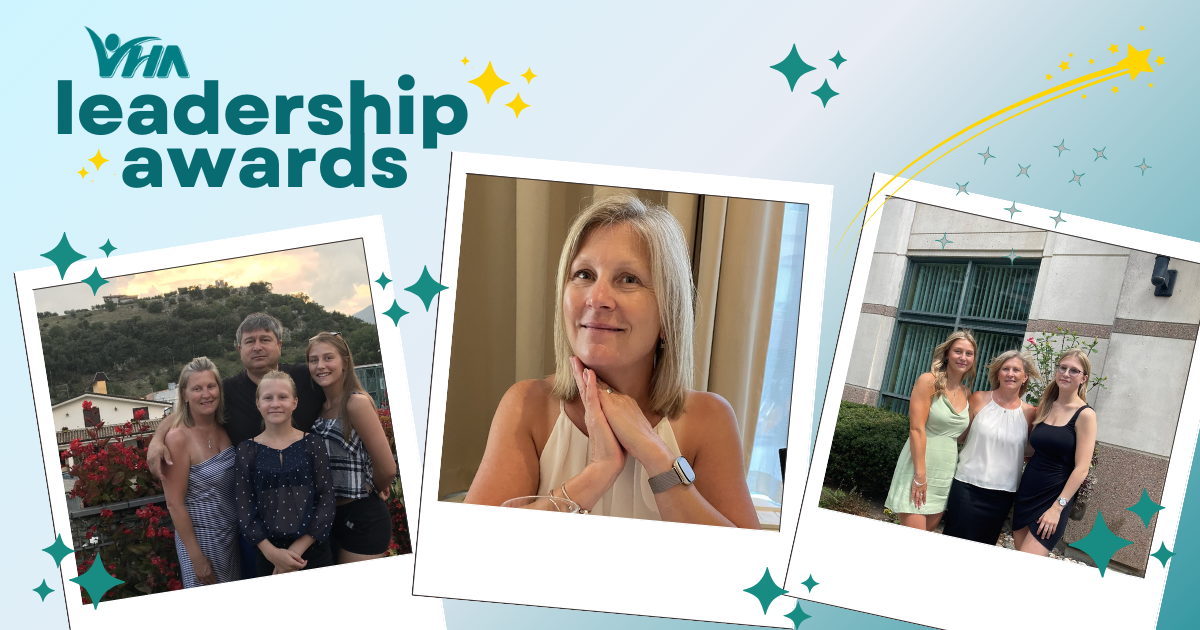Empowered Everyday: In Conversation with Leadership Award Winner Christina D’Orazio

The VHA leadership awards is an annual recognition program to further build and strengthen VHA’s culture of leadership excellence by recognizing individuals at all levels who demonstrate impactful leadership.
Christina D’Orazio, Registered Nurse, is a Leadership Award recipient in the Empowered Everyday category. Awardees in this category raise the bar for themselves and others around them and embody a “can-do” spirit that is infectious to others. They pay it forward by taking a coach approach to leadership, passing on their knowledge and expertise to others, and challenging others to push to become the best possible version of themselves. In her role, Christina has made a remarkable footprint as she’s exemplified many characteristics of Empowered Everyday. One nomination notes, “Over the course of Christina’s 17 years at VHA, she has generously precepted many students across multiple disciplines with the goal of providing budding learners with an appreciation of a person-and-family centred approach to address complexities of homecare nursing with the unique child and family population. Christina is known to be a mentor that one can reach out to problem-solve with and enhance client care.” We sat down with Christina to learn more about her approach to leadership and her journey at VHA so far.
VHA: You’ve been selected in the category “Empowered Everyday.” Congratulations! Could you tell us what being empowered everyday means to you?
Christina: Empowered Everyday means helping families, clients and staff become confident and prepared to be able to complete a procedure. This could be anything from teaching a kindergarten student to check their blood sugar, supporting a teacher with treating hypoglycemia, to families managing the complex needs of their children and nurses learning how to use the different pumps utilized in the community. Empowerment is facilitating knowledge and teaching a skill for an individual, family member or nurse to feel confident and secure to manage tasks. The ultimate goal is to enable independence by facilitating confidence in one’s ability to manage their own care.
What motivates you to do the work that you do?
Being able to help clients, mainly children, when they need it is what motivates me most. I strive to do this by providing support and teaching to encourage independence. I feel a sense of satisfaction when I see clients progress to discharge or the ability to manage their own needs.
Could you tell us about an achievement, inside or outside of work, that you’re proud of?
A work-related achievement I’m proud of is my completion of both the Diabetic Educator course through UHN and the Comprehensive Advanced Palliative Care Program at Scarborough Centre for Healthy Communities. These were a major learning curve for me as I am not strong with online learning. Outside of work with the help of my husband, I am very proud of my children. From a very young age they were engaged in community affairs—sports, volunteerism, and active in extracurricular programs. They have grown into very independent, strong, confident young women.
When you look back on your journey at VHA so far, is there a moment or situation that stands out where you learned something that changed your perspective? This can be anything- big or small!
I can’t pinpoint one specific situation but there’s been a continuum of change over the years, mainly with the advances in technology. These advances ultimately changed the way we deliver care to clients. Examples include CADD infusion pumps, Insulin pumps, and most recently, virtual care visits and assessments allowing us to deliver care in new and exciting ways.
There’s no doubt that a huge part of being a leader is teamwork. Do you have any advice for how to build that connection and trust?
Absolutely. I think building trust is such an important part of teamwork. Have a conversation with your clients and take time to get to know them. It will help them feel more comfortable and ultimately will help you as the nurse because they will feel safe to open more. Be honest, supportive and patient with yourself and others, because learning a new skill does not happen overnight. If you are unsure of a question that a client or nurse has asked, don’t be afraid to say “I’ll get back to you” and come back later with the correct information. Most importantly, treat everyone the way that you want to be treated, with respect and compassion.
If you enjoyed this article, you may also want to read:
